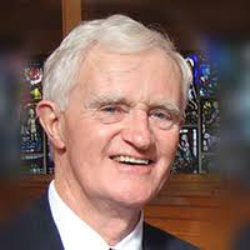Eric Hodgens. Christmas Peace A Paradox
December 19, 2015
Christmas is a Christian afterthought. The earliest Christian writings (Pauls epistles and Marks Gospel) dont mention Jesus birth. The first to do so is Matthews gospel where the author posits the birth simply as another event in the fuller story of Gods salvation of His people. Lukes gospel has the more discursive story containing Mary and Josephs journey to Jerusalem, the stable and the shepherds recognising the newly born saviour who is Christ, the Lord. The main story is Jesuss life, death and resurrection to a new form of life.
A Tony Abbott recent speech claims that Islams problem is that, unlike us, it has not had the benefit of a reformation or enlightenment. The oversimplified argument runs: Europe has experienced the Renaissance, Reformation and Enlightenment. Out of this experience has come the modern, secular state with its commitment to human rights. Christianity, being the dominant religion of Europe, has equally benefited from this experience. On the other hand Islam is of Middle Eastern origin and its history did not include these experiences. Hence Abbotts advice to Islam.
The advice is not well thought through. Islam has had its own watershed experiences. The Sunnis came out on top of the Shia in the 7th century. In the 10th century argument between the Mu’tazilites and the Asherites, Revelation in the Quran won out against reason as the source of truth thus reinforcing the power of the Ulema (scholars of Muslim religious law) over the philosophers. Sufism was a new development of the 13th century. The Wahhabism of Saudi Arabia is the result of an 18th century puritanical reform movement.
However, Europe, after the Reformation and Enlightenment, is no poster boy for harmony. The Reformation and the Enlightenment promoted rather than protected Europe from conflict. The reformation spawned Europes horrific Thirty years War. The Enlightenment led to Frances Reign of Terror. Since then we have had two world wars originating in Europe and plenty of new guerrilla movements like the IRA, Baader-Meinhof and the Red Brigades. We have simply re-defined terror from state-sponsored to group-sponsored.
Further, the history of the Muslim South looks very like Europes when you recall the counter insurgency struggle in post-war Malaya, the Sukarno military terror and the Kopassus efforts in East Timor and West Papua. One senses that it is more to do with the haves and the have nots than with belief.
Now its the Middle Easts turn. The West, provoked by Islamist guerrilla attacks, has sewn the wind by invasion and reaped the whirlwind. The Islamists are just a new grouping of guerrillas who wave an Islam flag rather than a communist, Christian or nationalist one. How do we sort this mess out?
The common denominator seems to be the closed mind of fundamentalist ideology. We see it in ISIS and Al Qaeda. But we also see it in Donald Trump, the USA Tea Party, the Bolt Report, the black armband historians, the Pell faction in the Vatican and the hard right of the Australian Liberal party instanced by Tony Abbott. Peace entails give and take. If you close your mind you cant negotiate. Its all or nothing.
One positive result of the Enlightenment is the development of historical and literary criticism. The historico-critical method can analyse and explain institutions and their literature. It is the opposite of fundamentalism which interprets texts literally and laws as eternal.
The opening assertion of this article - that Christmas is a Christian afterthought - is an application of the historico critical approach.
Fundamentalist Christians read their texts literally. God sent Jesus from heaven with a ready-made plan to set up the Church with all its beliefs, structures, laws and practices. The plan begins with the coming of Jesus. He grows up, preaches his message, picks his followers and gives them the blueprint for the future. The result is the Christianity of today.
But an historico-critical examination of the Christian beginnings and scripture shows that there was a staged evolution of the way Jesuss followers came into being, organised themselves and developed their belief system. The more you get to know the context and the power play of what went on, the more insight you get into the reasons why it developed the way it did.
The leadership of Protestant and Catholic Christianity opposed enlightenment ideas in the 19th and 20th centuries. Look at Pope Pius IXs infamous Syllabus of Errors of 1864. The start of the 20th century was marked by Pope Pius Xs witch-hunt against Modernism and the USAs Protestant Fundamentalist movement. New thought tends to undermine the power of the ruling group. So, religious hierarchies tend to oppose new thought whether Christian Islamic or other.
Todays Christianity is a product of history. So, too, is todays Islam. Islam would benefit from an historico-critical analysis of its scriptures, traditions, history and institutions. If this could happen, overcoming clerical opposition, it would be liberating for Islam.
Meanwhile, Christmas is a feast of peace. Or is it? The inquisitions, the crusades, the religious wars, slavery, colonial conquest, witch hunts, apartheid, racist pogroms have been dark periods for church as well as the state.
Luke is our most Christmassy gospel writer. His angels greet the new-born saviour with the song: Glory to God in the highest; and, on earth, peace to men of good will. Good will is the key to peace. If Christmas can promote more good will it can then be a feast of peace.
Eric Hodgens is a Catholic Priest who writes a bit.
